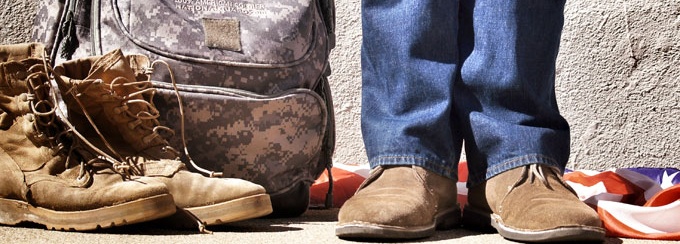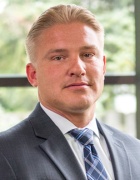
Expert guidance for veterans’ legal needs
Western New York military veterans, including some who are UB students, have a new set of advocates.
The School of Law’s Veterans Legal Practicum has launched this year with a number of initiatives to help veterans, service members, and their families with their unique legal needs. This semester, several dedicated help desks, staffed by law students taking part in the practicum, will be on campus in the UB Student Union, in Niagara County, and at WNY Heroes, a veterans advocacy organization in Amherst, NY. As part of the pilot program, the practicum students will coordinate with other local community partners, and the program will continually evolve to best serve those who have served.
Attorney Anthony J. Kuhn ’15, who co-directs the practicum with Professor and Vice Dean Kim Diana Connolly, says the students will provide general information and referrals for many types of legal assistance. “That could mean applying for service-connected compensation for injury, spousal benefits, education benefits, GI Bill benefits,” Kuhn says. “Sometimes the military is difficult to work with, and it can be difficult to establish benefits.” Veterans may also seek counsel on legal issues not specifically related to their military service, such as traffic infractions.
Kuhn comes to the practicum with both professional experience – he practices veterans law at Tully Rinckey PLLC where he is the managing partner of the law firm’s Buffalo office and the chair of the firm’s nationwide Military and National Security Practice Groups – and as a veteran himself. He has been in the Army since 1996, including active-duty service and an overseas deployment, and continues in the Army Reserve. Kuhn is a brigade-level operations NCO with more than a decade of experience training and supervising thousands of soldiers and officers across two different countries’ armed forces.
Conference Details

Thank You For Your Service: A Human Rights Conference for Veterans, Service Members, Their Families & Their Advocates
April 26, 2019
8:15 a.m. - 4:00 p.m.
University at Buffalo School of Law
John Lord O'Brian Hall, Buffalo, New York 14260-1100
The day-long conference, which is free of charge, includes breakfast and lunch, and attorneys who attend may receive 4.0 NYS CLE credits in the area of Professional Practice (transitional or non-transitional credit).

Anthony J. Kuhn '15
The Veterans Legal Practicum is being funded through a three-year Justice for Heroes grant from Gov. Andrew Cuomo’s office, secured with the help of the New York State Division of Veterans’ Affairs.
As a teaching vehicle, Kuhn says, “We want to create an environment where students who are interested in representing vets or service members (perhaps they are veterans themselves, or have a family member or indirect tie to service) can join this practicum and have the opportunity to practice providing legal services, and give some real help to an underserved population.”
“As is true of all UB School of Law practicum courses, there is a strong classroom component with in-depth, real world readings to prepare students for the service learning component,” says Connolly, who directs the School of Law’s clinical education program and has specialized in experiential learning for almost 20 years. “We have also integrated other vital skills training, including working with clients, functioning in teams, operating with proper trauma-informed lawyering, and using reflection and self-evaluation to ensure excellence in practice.”
The local need is great. Of the more than 900,000 veterans in New York State, Erie County ranks among the top five counties for veterans. In Erie County, 68 of every 1,000 individuals are veterans. According to UB’s Office of Veteran Services, there are 171 veterans and 85 people in active service on campus. The on-campus help desk will serve students, faculty and staff. The non-UB location will be open to all veterans.
As an example of the body of law the students are studying, Kuhn says one common issue is seeking to change a veteran’s discharge status. Those whose discharge is classified as less than honorable are ineligible for some benefits; but, he says, “a lot of soldiers get discharged without knowing their rights.” Knowledgeable lawyers can help them appeal that designation to review boards or the federal Department of Veterans Affairs directly, arguing that an error or injustice has been committed.
In addition to the help desks, the practicum is creating a training program to help local businesses understand the rights of veterans who are accompanied by service dogs, and developing a network of referral sources for veterans services. Interested alumni can get in touch with Kuhn at (716) 439-4700.
“My hope,” he says, “is that we can become one of the nation’s largest and most productive veterans law practicums and eventually create a large clinic. We have a huge veteran population in Erie and Niagara counties, and this is just a start.”
Another major veterans-related project is a Veterans Human Rights Conference scheduled for April 26 at the School of Law, co-sponsored by the school, the New York State Division of Veterans’ Affairs, and the New York State Division of Human Rights. With a diverse audience expected – lawyers practicing veterans and human rights law, veterans service officers, lawyers interested in new pro bono opportunities, veterans and their families, and interested community members – the daylong conference aims to dispel misconceptions and raise awareness of the issues America’s past service members often face.
Benjamin Pomerance, deputy director for program development with the Division of Veterans’ Affairs says there are often-forgotten veterans who are incarcerated, or who were less-than-honorably discharged because they came out as gay or because post-traumatic stress disorder got them into trouble while they were still serving. There are employers leery of hiring veterans, and landlords reluctant to rent to them, because of misguided stereotypes.
“When we see veterans, we all say, ‘Thank you for your service,’ ” Pomerance says. “This conference explores what that really needs to mean."
UB School of Law will a launch a for-credit online Veterans Law course this summer. This three-credit course will be open to law students, interested graduate students, and lawyers looking for more in-depth training. This innovative, detailed course will be completed entirely online at the convenience of its students. For more information, contact law-clinic@buffalo.edu.